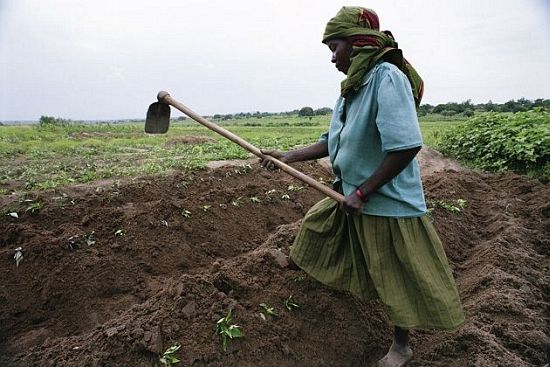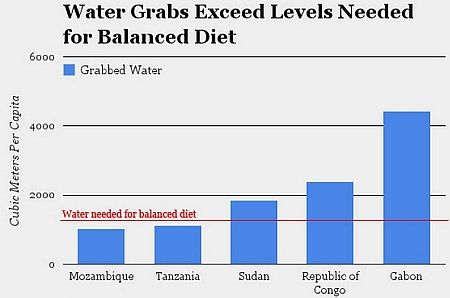Water Privatisation: A Worldwide Failure?
 ?itok=NmwTEdzw
?itok=NmwTEdzw
“In the last five years the failure rate of water and sewerage privatisations has increased to 34%, compared with a failure rate of just 6% for energy, 3% for telecommunications and 7% for transportation, during the same period”, said Anna Lappé, director of the Small Planet Institute
“Public officials often claim that due to government budget constraints they are being forced to pursue ‘partnerships’ with the private sector. But this justification is dangerously misleading, since the private sector consistently relies on the government or taxpayers to fund infrastructure, while extracting a profit, the margin of which can even be guaranteed in concession contracts,” he said.
Full article: http://www.stopcorporateabuse.org/news/water-privatisation-worldwide-failure
Would you rather get your water from your city government - or from a corporation?
 ?itok=tfhiF-EY
?itok=tfhiF-EY
Private water corporations frame water in business terms, placing economic outcomes over social objectives, preventing prioritization of the poor and vulnerable. Treating water as a mere commodity also relegates it to the whims of the market and bypasses the accountability and transparency of the public sector.
But the cruel effects of water commodification are felt worldwide. With the water shutdown, Detroit exhibited the sort of neoliberal politics that foster both “austerity” and the usual policy response—privatization. When the water got shut down last summer—collectively punishing supposedly “delinquent” customers who were behind on their bills—CAI and community groups expressed fears about the city’s move to consult with a premiere water multinational, Veolia, about revamping the water system and cutting costs. CAI Media Director Jesse Bragg believes Veolia may be looking to seize control of its public water infrastructure, as it has done in other regions, and that with Detroit’s finances in a desperate state, “Veolia may recommend privatization and use this contract as a foot in the door.”
Until now, much of the anti-privatization advocacy has centered on the Global South. For example, in regions of India and the Philippines, neoliberal foreign investment combined with impoverished infrastructure has led to a World Bank water scheme that CAI blames for high costs, constraints on access, polluted water and failing infrastructure.
Full article:
http://www.stopcorporateabuse.org/news/would-you-rather-get-your-water-your-city-government%E2%80%94or-corporation
Are African Land Grabs Really Water Grabs?
By Jennifer C Franco and Lyla Mehta and Gert Jan Veldwisch
Source: CNN Wednesday, March 27, 2013
Full Article: https://zcomm.org/znetarticle/are-african-land-grabs-really-water-grabs-by-jennifer-c-franco/
http://www.cnn.com/2012/07/05/business/op-ed-africa-land-grab/index.html
Global Land And Water Grabbing
http://www.pnas.org/content/early/2013/01/02/1213163110.abstract
[IMG]
 [/IMG]
[/IMG]
In 2010, a former Wall Street trader flew into war-torn Sudan to negotiate a deal with a thuggish general. He had his eye on a 1 million acre tract of fertile land fed by a tributary of the Nile in the southern section of the country, a region that later claimed its independence as South Sudan. The investor, who planned to profit by developing and exporting agricultural commodities, boasted about how the region's instability was a principal variable in his financial model: "This is Africa," he told reporter McKenzie Funk, who shadowed him for a riveting piece in Rolling Stone (PDF). "The whole place is like one big mafia. I'm like a mafia head."
Over the last decade (and especially during the last four years) wealthy nations have increasingly brokered deals for huge swathes of agricultural land at bargain prices in developing countries, installed industrial-scale farms, and exported the resulting bounty for profit. According to the anti-hunger group Oxfam International, more than 60 percent of these "land grabs" occur in regions with serious hunger problems. Two-thirds of the investors plan to ship all the commodities they produce out of the country to the global market. And droughts, spikes in food and oil prices, and a growing global population have only made the quest for arable land more urgent, and the investments that much more alluring.
[IMG]
 [/IMG]
[/IMG]
Of the countries that lost the highest percentages of their cultivated land, nine out of 10 have malnourishment rates of 5 percent or more (see chart below). And according to Foreign Policy and Fund for Peace's Failed States Index, all the states in the graph below, with the exception of Uruguay, are categorized as unstable.
PuraVidaDreamin
(4,110 posts)We are next.
polly7
(20,582 posts)be almost universal at this point ... and it's only going to get worse. Restrictions to conserve supply, I agree with ... but keeping life-sustaining water from anyone should be criminal, imo.
Baltimore Shutting Off Water To Thousands
By MintPress News Desk
Source: MintPress News
May 1, 2015
That total reflects only a small portion of the $40 million owed to the city, however. Commercial accounts owe roughly $15 million, and of that total, 40 businesses owe $9.5 million.
Writing for the Baltimore Brew, Mark Reutter and Danielle Sweeney point out that the biggest delinquent account is RG Steel, which is owned by a wealthy billionaire investor. Despite unpaid bills amounting to about $7 million, the city won’t see any of that money because the assets of RG Steel’s Sparrows Point steel mill were liquidated in a bankruptcy.
Reutter and Sweeney warn that shut-offs could soon affect 600 residential customers per week. Likewise, human rights advocates are sounding the alarm. The Sun reports:
https://zcomm.org/znetarticle/baltimore-shutting-off-water-to-thousands/
justhanginon
(3,290 posts)large parcels of land in Paraguay. This acreage is over one of the worlds largest aquifers so I can only imagine the future purpose they have in mind for this acquisition. And it ain't good!
polly7
(20,582 posts)I've never seen absolute proof of it, but so many articles have claimed it and I don't doubt, personally, that it's true. The sense of entitlement it takes to exploit a poorer nation's resources for pure personal gain is almost mind-boggling, until you realize the whole family's operated on greed, corruption and a complete lack of awareness of the millions of human beings their actions have already hurt, maimed, made homeless and killed. Their holdings in every country on earth should be confiscated and returned to those people who inhabit them. War criminals (or anyone else, but especially warmongers) should not be allowed to further profit off the suffering of anyone or anything.
Doctor_J
(36,392 posts)the guillotines. It seems we will put up with literally anything.
Judi Lynn
(160,644 posts)There has to be a way these people can be removed from harming the human race through their greed and ruthlessness. Having power over the well-being of living beings and abusing it is evil.
This has to be changed as soon as possible.
Thank you for these links.